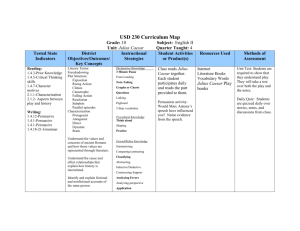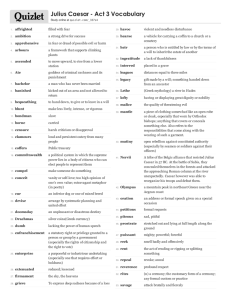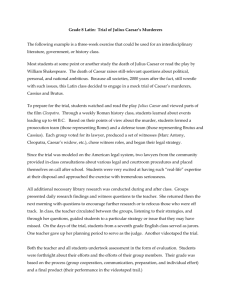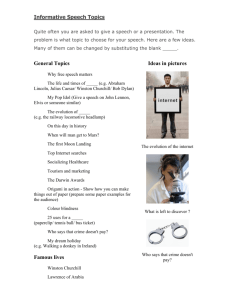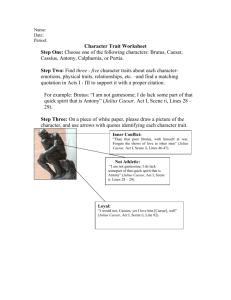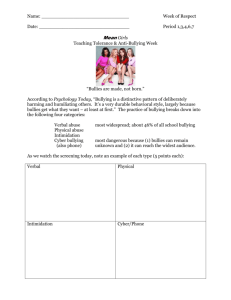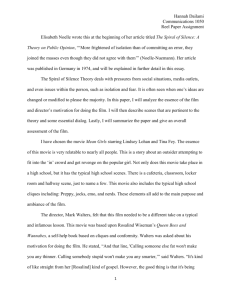NAME: Ms. Marootian CP I: Julius Caesar Unit Film Study: (30 points
advertisement
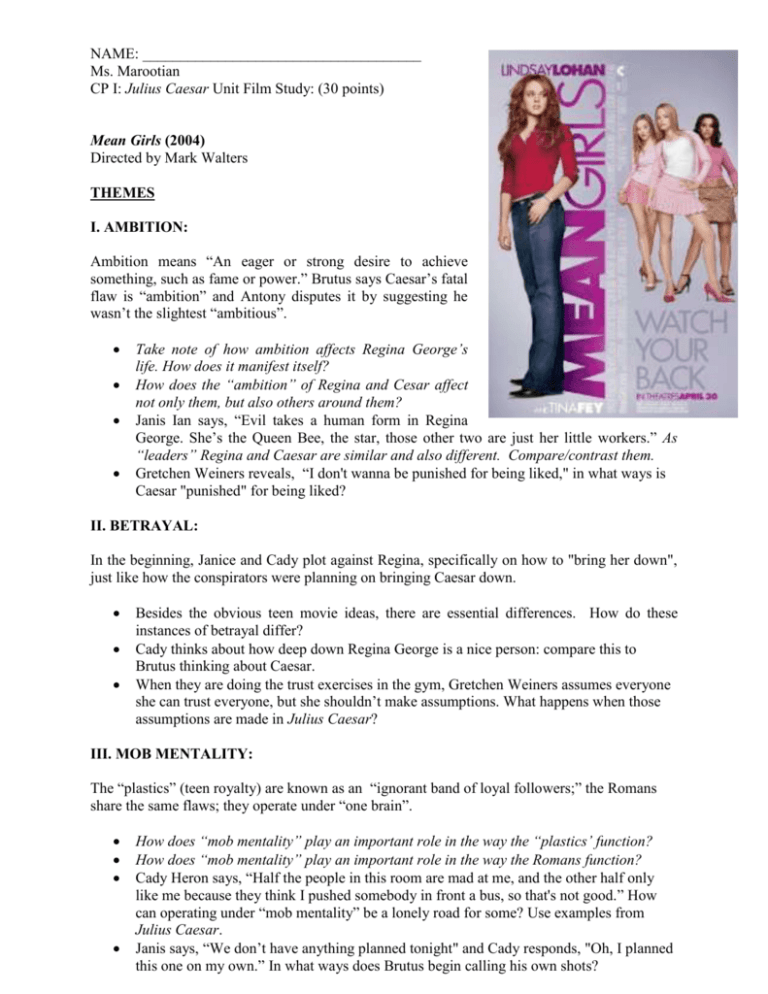
NAME: _____________________________________ Ms. Marootian CP I: Julius Caesar Unit Film Study: (30 points) Mean Girls (2004) Directed by Mark Walters THEMES I. AMBITION: Ambition means “An eager or strong desire to achieve something, such as fame or power.” Brutus says Caesar’s fatal flaw is “ambition” and Antony disputes it by suggesting he wasn’t the slightest “ambitious”. Take note of how ambition affects Regina George’s life. How does it manifest itself? How does the “ambition” of Regina and Cesar affect not only them, but also others around them? Janis Ian says, “Evil takes a human form in Regina George. She’s the Queen Bee, the star, those other two are just her little workers.” As “leaders” Regina and Caesar are similar and also different. Compare/contrast them. Gretchen Weiners reveals, “I don't wanna be punished for being liked," in what ways is Caesar "punished" for being liked? II. BETRAYAL: In the beginning, Janice and Cady plot against Regina, specifically on how to "bring her down", just like how the conspirators were planning on bringing Caesar down. Besides the obvious teen movie ideas, there are essential differences. How do these instances of betrayal differ? Cady thinks about how deep down Regina George is a nice person: compare this to Brutus thinking about Caesar. When they are doing the trust exercises in the gym, Gretchen Weiners assumes everyone she can trust everyone, but she shouldn’t make assumptions. What happens when those assumptions are made in Julius Caesar? III. MOB MENTALITY: The “plastics” (teen royalty) are known as an “ignorant band of loyal followers;” the Romans share the same flaws; they operate under “one brain”. How does “mob mentality” play an important role in the way the “plastics’ function? How does “mob mentality” play an important role in the way the Romans function? Cady Heron says, “Half the people in this room are mad at me, and the other half only like me because they think I pushed somebody in front a bus, so that's not good.” How can operating under “mob mentality” be a lonely road for some? Use examples from Julius Caesar. Janis says, “We don’t have anything planned tonight" and Cady responds, "Oh, I planned this one on my own.” In what ways does Brutus begin calling his own shots? IV. TRICKERY: Both Cady Heron and Cassius use trickery to persuade Gretchen Weiners and Brutus; what forms are they and what makes them effective? V. THE POWER OF PERSUASION: In Julius Caesar, Persuasion is an extreme force that causes characters to make certain decisions. Janis Ian says, "why would we get you into trouble? We’re your friends. Cady Heron responds, “I know its wrong to skip class, but Janis says we were friends and I am in no position to pass up friends.” What governs decision making in the film? What governs decision-making in the play? In the end, Cady decides to break her crown up into pieces, how does this help in getting the crowd to like her? Compare this speech to Antony's speech. VI. PUBLIC V. PRIVATE The characters in Mean Girls function differently in public as opposed to private. How do they act differently? Why? The characters in Julius Caesar function differently in public as opposed to private. How do they act differently? Why? VII. FOOD CHAIN Describe the food chain in both Mean Girls and Julius Caesar. Several people say, “You can't join Mathletes its “social suicide” what does social suicide mean? VIII. A LOVE STORY? In what way is Julius Caesar a ‘love story?” In what way is Mean Girls a “love story?” VIII. PERSON REFLECTION: Cady says, “Calling somebody else fat won't make you any skinnier. Calling someone stupid doesn't make you any smarter. And ruining Regina George's life definitely didn't make me any happier. All you can do in life is try to solve the problem in front of you.” How do you personally connect with your life? Cady says, “The more people who are scared of you, the more flowers you’ll get.” What do you think this means? Janis says, “There are two kinds of evil people, people who do evil stuff and people who see evil stuff and don't try to stop it.” What does this mean to you? How can you apply this thinking to your own life?
